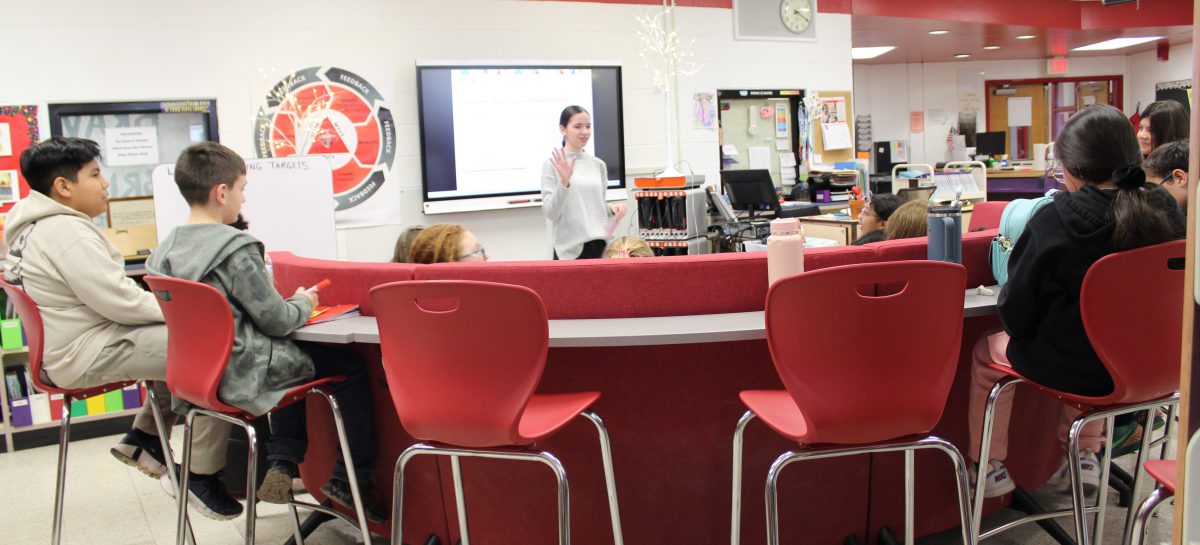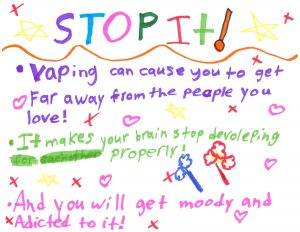Anti-vaping message spreads at LMS

Fifth-graders in Jill Parks’ WINN (What I Need Now) class at Liberty Middle School learned more than to just say “no” to vaping, they also learned the reasons behind why they should say no.
 “Vaping is bad because it can change the way your brain works if you start at a young age,” student Alisha Morales said. “It can also cause lung cancer.”
“Vaping is bad because it can change the way your brain works if you start at a young age,” student Alisha Morales said. “It can also cause lung cancer.”
Nicole Blais, a Sullivan 180 prevention coordinator, recently visited Parks’ class for one period a day for five weeks to lead the CATCH My Breath program. CATCH My Breath is a peer-reviewed, evidence-based youth vaping prevention program developed by The University of Texas Health Science Center at Houston School of Public Health.
According to its website, the program provides up-to-date information to teachers, parents and health professionals to equip students with the knowledge and skills they need to make informed decisions about the use of e-cigarettes, including JUUL and disposable devices.
“(CATCH My Breath) changed how I think about vaping because I used to think that vaping wasn’t that bad for you until they told us how bad it was,” student Madison Hernandez said.
 Students in the enrichment class learned about the addictiveness of vaping, what chemicals can be found in the product, how inhaling those chemicals can affect the body and how some companies market the product to younger people. Blais encouraged students to spread the word about the dangers of vaping. During her first visit, students created posters highlighting what they had learned so far.
Students in the enrichment class learned about the addictiveness of vaping, what chemicals can be found in the product, how inhaling those chemicals can affect the body and how some companies market the product to younger people. Blais encouraged students to spread the word about the dangers of vaping. During her first visit, students created posters highlighting what they had learned so far.
“It is essential for students to be exposed to explicit direct instruction about how bad these products are for their health at an early age,” said Parks, who is one of LMS’ Wellness Advisors. “It is much harder to change a habit than start one.”
This is the second year the program has been available for LMS fifth graders. Last year, it was held in partnership with the Boys & Girls Club after school.
The program is new for Sullivan County and fits in well with the district’s Sullivan 180 Empowering a Healthier Generation Program, Parks said. The goal is to eventually have every LMS student go through the program.
“Overall, an anti-vaping program not only addresses a critical health issue among students but also reinforces the values, goals and strategic priorities of the Liberty Central School District,” she said. “It reflects a holistic approach to student well-being and success within a diverse and supportive educational community.”

The program also touches on several pillars of the district’s strategic plan. It can be integrated into the existing health education curriculum, ensuring all students receive comprehensive education about the risks of vaping. Collaborating with parents, teachers, health care professionals and community organizations can strengthen the impact of the anti-vaping program and provide ongoing support to students. And developing and implementing an anti-vaping policy and related procedures aligns with the district’s commitment to integrating its mission and vision into all aspects of its operations.
It appears students are hearing the message of the dangers of vaping.
“People use celebrities to get kids’ attention to e-cigarettes,” student Ely Garcia Garcia said, “but vaping is so, so bad and I will never, ever vape.”

